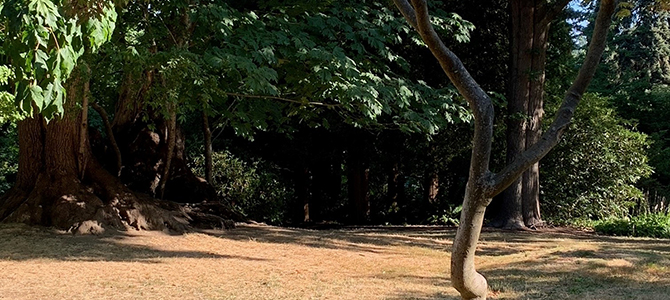
Stanley Park to temporarily close overnight due to extreme fire risk
The current conditions in Stanley Park are extreme right now and given the size of the park, the risk of a fire breaking out overnight when fewer people may notice it or report it presents a significant threat to the wellbeing of the park.
Amit Gandha, Director of Park Operations
The Vancouver Board of Parks and Recreation will be temporarily closing all non-essential access to Stanley Park between the hours of 10 pm and 6 am beginning tonight. The closure is being activated in an effort to reduce the fire risk to the park, which is extreme due to the current drought conditions and sustained heat events.
Temporary overnight access control points
Park Rangers will set up temporary overnight access control points at five locations across the park to reduce the number of individuals in the park overnight. Vehicles, bicycles, pedestrians, and anyone who does not require access to the park will be turned around at access control points.
Anyone requiring entry into the park during the closure, including the #19 bus, emergency services, patrons, and staff of park businesses, will be permitted to enter through the control points. Individuals who remain in the park after the closure begins will have unrestricted access to leave the park through the control points.
The access control points will be positioned at the following locations:
- Traffic circle off Georgia St
- The corner of Barclay and Park Lane
- The corner of Beach Ave and Park Lane
- The south exit of the Stanley Park Causeway
- The north exit of the Stanley Park Causeway
The Causeway will remain open but access to the seawall will be closed. Signage will be placed along the access points of the seawall to advise pedestrians and cyclists of the closure. Park Rangers will be patrolling the park throughout the closure to monitor activity.
The temporary closure will be in effect seven days a week beginning Friday, July 30 and will extend indefinitely until the fire risk has been significantly reduced.
Stanley Park tree species and history
Stanley Park is Vancouver’s largest urban park, with more than 400 hectares of naturalized West Coast forest. The park has approximately half a million trees – mostly cedar, fir, and hemlock – some of which are hundreds of years old.
The park has a vast history as well as historical and present day cultural significance to the Musqueam, Squamish, and Tsleil-Waututh nations, whose ancestors first inhabited the unceded territory.
Quote
Amit Gandha, Director of Park Operations
“The current conditions in Stanley Park are extreme right now and given the size of the park, the risk of a fire breaking out overnight when fewer people may notice it or report it presents a significant threat to the wellbeing of the park, its trees, wildlife, and everyone who relies on the park and its ongoing health,” said Amit Gandha, Director of Park Operations. “We have been in close contact with our partners at Vancouver Fire and Rescue Services as well as the Vancouver Police Department and they fully support this proactive measure to reduce the risk of a catastrophic fire in the park.”
